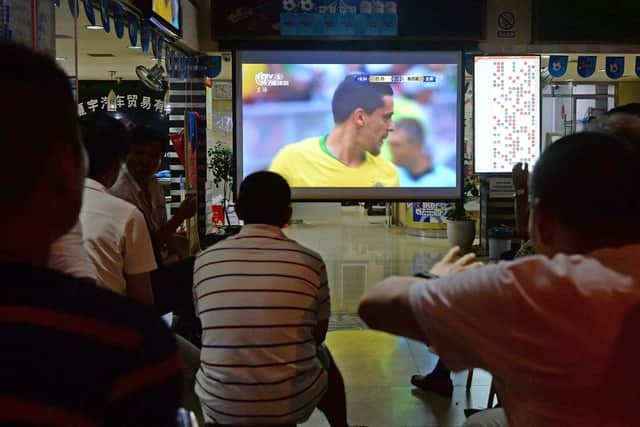The Premier League’s ban on gambling sponsors is too little, too late
and live on Freeview channel 276
It’s three weeks to the day since the UK Gambling Commission fined Platinum Gaming and 32Red, who have been a shirtfront sponsor for Rangers, Derby County and Middlesbrough, over £7m for ‘social responsibility and anti-money laundering failures’. Five days later, William Hill Group, the company whose bookkeeping arm adorns adverts around almost every football match, were fined a record £19.2m after their own “widespread and alarming” failures.
These are the companies that the Premier League, the EFL and almost every sporting body has happily jumped into bed with over recent years – companies that, through intention or negligence, have been found to have failed to safeguard customers with damaging gambling habits, instead allowing themselves to turn a profit from the pain of others. Now the Premier League has announced a new ‘voluntary’ agreement between its member clubs to ban front-of-shirt gambling sponsors from the summer of 2026. It is a minuscule gesture from a body which has grown fat from the revenue of companies which endanger their own customers.


Advertisement
Hide AdAdvertisement
Hide AdThe ban – the vote on which saw 18 clubs agree and two, unnamed, sides abstain – does not extend to shirt sleeve sponsors, or advertising hoardings, and nor does it have any impact on television advertising around football. The eight clubs who currently bear gambling company logos on their chests will have three years to find new sponsors willing to shell out the millions demanded for such prime advertising real estate, but they will presumably be free to continue filling their coffers from every other kind of partnership with gambling companies that are available – and there are many.
It is always hard, when berating the many gambling companies who have been fined for their vulturish activities, not to come across as overly moralising – many of us enjoy the occasional flutter and this is not about a sly fiver placed on the first goalscorer here and there. But gambling has the proven ability to cause immense and immediate harm to those who become addicted, and many gaming companies have taken advantage of the victims of that addiction. Numerous companies whose failings – intentional or otherwise – have been punished by the UK Gambling Commission have direct sponsorship links with British football and the Premier League, and it has taken years for the league to do anything about it. Even now, the steps taken are baby ones.
Many of the gambling companies which sponsor sports in the UK are also potentially criminal. A number of Far Eastern companies, predominantly based in the Philippines, use Premier League advertising to access the Chinese market, where English football is hugely popular but where sports gambling is entirely illegal. A recent investigation by Josimar found possible links between those companies and organised crime in China – links that Premier League clubs ignore as they take the money of these companies, which typically have no transparent ownership in the UK and sometimes do not have public-facing websites for British customers to use their services even if they wanted to.
Many of those same companies operate in the UK via a ‘white label’ agent, an intermediary who obtain for them a UK gambling license. One such company, the Isle of Man-based TGP Europe, has cornered large parts of the British football market and was fined on 5th April for their own safeguarding and anti-money laundering failures. The business practices of many of the overseas companies that are gaining access to the British market are opaque at best, but there is no evidence that the clubs they strike deals with are especially interested in doing the due diligence to determine whether or not they are legal or ethical companies with which to partner.
Advertisement
Hide AdAdvertisement
Hide AdThe Premier League statement made today also announced the development of a “new code for responsible gambling sponsorship”. No details or timeframe exist yet, and it remains to be seen how many of the ethical dilemmas that gambling sponsorship creates will be addressed, but shirtfront logos are just the tip of an especially insidious iceberg. There has also not been any word from the EFL at the time of writing, who are themselves sponsored by SkyBet.
James Grimes, a recovering addict who set up The Big Step, a campaign group petitioning football clubs to sever ties with gambling sponsors, described the move as “a significant acceptance of the harm caused by gambling sponsorship” but also noted that “just moving logos to a different part of the kit while allowing pitchside advertising to continue is totally incoherent.”
We want your feedback on 3 Added Minutes - details here
As my colleague Jason Jones noted in his excellent article around the farce of the FA charging Ivan Toney over his gambling while continually endorsing the practice itself, there are an estimated 430,000 people suffering from compulsive gambling habits in the UK, only 5% of whom will seek help. Gambling addiction is not a minor concern affecting a small proportion of people – it wrecks thousands of lives every year, and this new ban – with its three year amnesty – is the first tiny forward movement taken by the Premier League when it has earned huge sums of money from the gambling industry over the past three decades. It’s a welcome step, to a point, but they have to go much further, much faster, if they wish to prove that they truly care about the damage done by gambling addiction.
Comment Guidelines
National World encourages reader discussion on our stories. User feedback, insights and back-and-forth exchanges add a rich layer of context to reporting. Please review our Community Guidelines before commenting.
